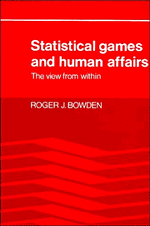Book contents
- Frontmatter
- Contents
- Preface
- 1 The reactive sample space
- 2 Response and social information
- 3 Response and strategic behavior
- 4 Publication and the political economy of prediction
- 5 Rational expectations and socioeconomic modeling
- 6 Games, beauty contests, and equilibrium: the foundations of structural invariance
- 7 Disequilibrium and noncooperative expectational games
- 8 The view from within
- References
- Index
3 - Response and strategic behavior
Published online by Cambridge University Press: 05 February 2012
- Frontmatter
- Contents
- Preface
- 1 The reactive sample space
- 2 Response and social information
- 3 Response and strategic behavior
- 4 Publication and the political economy of prediction
- 5 Rational expectations and socioeconomic modeling
- 6 Games, beauty contests, and equilibrium: the foundations of structural invariance
- 7 Disequilibrium and noncooperative expectational games
- 8 The view from within
- References
- Index
Summary
Introduction
Consider the following questions, all taken from the 1986 Australian Census:
Q.17: Does the person speak a language other than English at home?
Q.18: How well does the person speak English?
Q.24: What is the gross income (including pensions and/or allowances) that the person usually receives each week from all sources?
Q.33: In the main job held last week, how many hours did the person work?
Legal strictures notwithstanding, each of these questions is subject to the suspicion of untruthful responses for strategic reasons. Such questions have to be considered in their social context. Questions 17 and 18, which refer to aspects of migrant assimilation, have to be set against a continued and at times strident debate on immigration and its ethnic and social composition. Households continuing to speak Chinese or Italian at home might well choose not to reveal this. Question 24 should be set against prospective legislation on taxation policy or pension availability and general concern by social reformers with economic inequality as well as the traditional antipodean obsession with “tall poppies.” Finally, those in the public service, including academics and schoolteachers, have a motive to overstate their hours of work in question 33 since salaries and other benefits are ultimately tied to the public's perception of the demands on the time of their servants.
Getting people to truthfully reveal their preferences or intentions has long been recognized as a problem in certain fields of economics, in particular in the theory of the provision of public goods.
- Type
- Chapter
- Information
- Statistical Games and Human AffairsThis View from Within, pp. 53 - 92Publisher: Cambridge University PressPrint publication year: 1989



